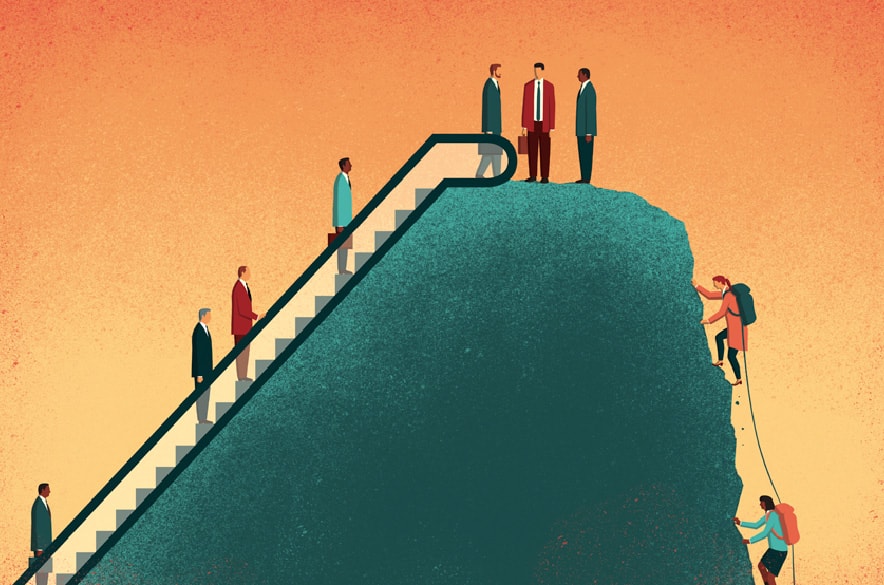Gender Inequality and Social Entrepreneurship

Guest post by Cindy Mitchel
I’m old enough to remember the days of cigarette advertising. For those of you that don’t,trust me, this was once a thing. There was a particular brand called Virginia Slims. The very well-known slogan was: “You’ve come a long way, baby.” The campaign started in 1968 at the height of the women’s liberation movement. The ads featured full-colour images of confident, tall, slender, pants suit-wearing women on the go, mirroring the mainstream awareness of the women’s rights movement. These images were juxtaposed with these vintage-looking sepia photos of women in more servile roles. Those photos were something you would have seen in ads from the early 1900s—women milking cows, knitting, or serving men.
Now, I’m a vintage ad geek and have been known to watch all 7 seasons of Mad Men in 5-7-hour long binges. I’m ashamed to say, not always on long-haul flights.
There was just something incredibly ironic about the co-opting of the feminist movement to sell cigarettes to women. Whatever your opinions of the tactic, it worked. For me, the campaign’s genius was that it succinctly captured the zeitgeist of the time and used it to market a product specifically to women. It makes me wonder though, what would capture the hearts and minds of women today in that way?
We live in very different times. Over the last two years, we’ve seen #metoo, a pussy-grabbing POTUS, endless memorials for women who have been senseless victims of male violence, and the increasing economic precariousness of women. We’ve also seen an emerging sense that baby, we haven’t come far enough!
At some point between all of the wonder, excitement and potential of the women’s liberation movement and now, something has gone horribly wrong.
I was moved by so many of the images from the Women’s Marches around the world—but I couldn’t take my eyes off the pictures of the older women. Their faces were lined pain and frustration as they marched alongside middle-aged daughters and their young granddaughters. They held up with signs like, “Why am I still protesting this shit?”
The hurt of a promise so painfully unfulfilled after so many years was palpable in these images.
I’m here today with a warning of sorts that relates to the area I work in—social entrepreneurship. We social entrepreneurs are men and women who are committed to using the tools of business to make a sustainable impact in our communities. We work with hybrid models.
We take what is often considered a charitable purpose, and we add in trade—or economic activity in an open and competitive market place.
Many of us are passionate about the inclusion of people who are typically marginalised and excluded by the mainstream market. As a result of this, I tend to work with a very diverse group of people—a lot of women of colour, people living with disabilities and various forms of mental illness, and people who identify as gay, lesbian or non-binary. I love my work. I draw strength from the changemakers I work with.
As someone who comes from the corporate world and venture capital, I understand mainstream business. I like being a Sherpa of sorts with people who can be considered outsiders. It means standing with them and recognising the unique barriers that each person encounters. These barriers are both internal and external.
I’ve been part of this movement for nearly a decade now, and in many ways, it has now become mainstream. That’s the same thing that happened with elements of feminism—it became a given. We all told ourselves: “Of course we believe in the equality of men and women!”
Some of us even told ourselves that we were in a post-feminist time. The struggle was in the black and white past because, gee, ‘haven’t we come such a long way, baby?’
But, without careful enough attention, the mainstream has a way of filtering a message and moulding a movement in a way that is more palatable and acceptable to White male patriarchy.
As the social enterprise movement becomes more mainstream a change has started to occur. I’ve noticed it in my practice that a large percentage of the women who came to Mill House for help seem convinced that the only way they could change the world was for them to operate as a not for profit.
I’m concerned that the zeitgeist of our time is that if a woman is saying she is going to change the world, the assumption is that she’s launching a not-for-profit organisation, a charity.
People don’t assume the same for men.
I had the privilege to attend the Social Enterprise World forum in Scotland last year. At one plenary session, they showcased the winners of the prestigious Social Enterprise Awards. But, as they flashed the team photos on the giant screen, I could hear an audible gasp from the audience around me.
It was exactly what you would expect to see from a mainstream business planning competition, business accelerator program or venture capital portfolio. There was one photo after another of White and Asian men. Now, please don’t get me wrong, I’m sure they were good ventures, and I am not bashing men or the judges.
But, ‘Houston, We have a Problem,’ in a movement that is about using commercial models to include those who are excluded, when those who are receiving the accolades are not teams that reflect the diversity of our world.
My concern—one shared by others in this movement—is that the social norms of mainstream business entrepreneurship are applied to those of who are trying to make the world better—social, economically, environmentally.
Of course, even those of us on the leading edge are not immune to the gender norms of the society we live in.
As a society, we tell women and girls that it is OK to care about health, education, the environment. But, we tell ourselves and our daughters that to make meaningful change in the world, you need to sacrifice a living wage for yourself.
You must volunteer your time, go and set out and raise money for your cause with your dinners, fundraisers and grant applications.
The ‘noble’ path for a woman who cares is to beg, not create wealth, still in 2019.
Operating a for-profit business—and, especially, the aggressive and disruptive qualities associated with business entrepreneurs are still considered ‘male’ traits. What is insidious about this idea is that is it often held just as strongly by some women as men.
Well, I’m sick of it.
We need women in for-profit business.
Specifically, we need women experimenting with the tools of the market and using them to create the change.
We need women who are in business to encourage other women—I’m not talking about exploitative multi-level marketing campaigns that scams/traps women in our communities, I’m talking about real businesses with unique value propositions and the potential to create both wealth and measurable, attributable social change.
The more women we see in mainstream business—the more the community will come to judge commercially-minded female social entrepreneurs just as competent and capable of innovation as men.
My message is that gender norms hobble women’s full participation in business also applies to those of us who are passionate about social innovation.
 Cindy Mitchel is the Program Director for Indigenous Women’s Entrepreneurship at Good Return. In this role, she oversees the collaboration between Good Return, its philanthropic partners and Kimberley Jiyigas. Working in support of Aboriginal and Torres Strait Islander female business leaders on the ground, she facilitates translating and disseminating the learning from the Maganda Makers Business Club in the Kimberley Region of WA to other parts of Northern Australia. Cindy has 15+ years of experience in social entrepreneurship, social impact investment and regional economic development. Throughout her diverse career, Cindy has been a passionate advocate for the entrepreneurial education and venturing of women and girls from diverse backgrounds as a vehicle for social and economic justice.
Cindy Mitchel is the Program Director for Indigenous Women’s Entrepreneurship at Good Return. In this role, she oversees the collaboration between Good Return, its philanthropic partners and Kimberley Jiyigas. Working in support of Aboriginal and Torres Strait Islander female business leaders on the ground, she facilitates translating and disseminating the learning from the Maganda Makers Business Club in the Kimberley Region of WA to other parts of Northern Australia. Cindy has 15+ years of experience in social entrepreneurship, social impact investment and regional economic development. Throughout her diverse career, Cindy has been a passionate advocate for the entrepreneurial education and venturing of women and girls from diverse backgrounds as a vehicle for social and economic justice.



Omar Khalifa
Excellent article!
The moment we embraced the “non-tech” version of entrepreneurship at iAccelerate our startup founder gender balance went from just over 30% to over 50%. These new enterprises were more sector balanced and representative of societal needs – which happen to be in the highest employment growth areas (health, education, retail, food and accommodation).
While we are experimenting with running two models of entrepreneur acceleration we are careful not to be exclusionary and allowing for cross-over by founders of the alternative models. Instead of thinking that social enterprises need to act more like unicorns, it’s time the profit driven entrepreneurs learned a thing or two about running ethical and purpose-driven businesses even if purely for provit. One day perhaps the majority of startups will be assumed to be social enterprises and we will talk of the rest as the special cases.
For now, perhaps we can all agree that the model that has driven businesses to deliver the world we live in today is no longer sustainable nor desirable for many. We need a recalibration of what we value. It will be women that will motivate and dominate this change if for no other reason that women have long been excercising the skills, values and sectoral knowledge we so desperately need in the wheelhouse.